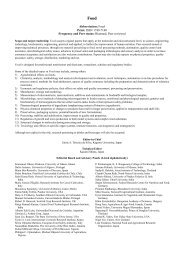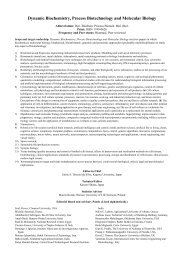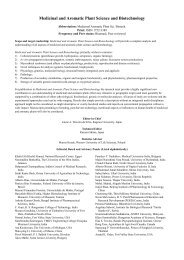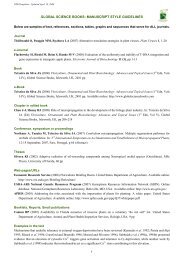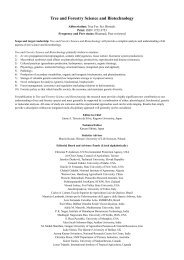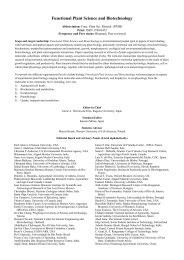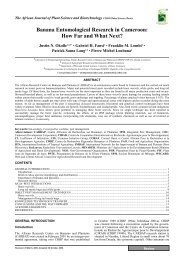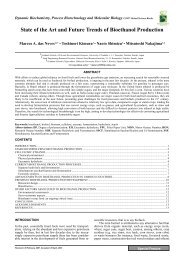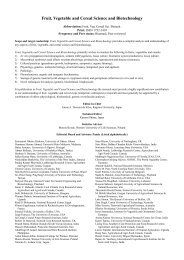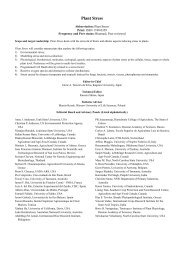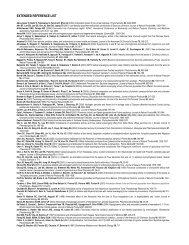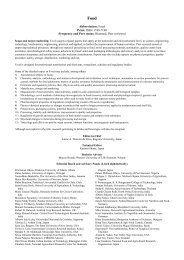Medicinal and Aromatic Plant Science and Biotechnology
Medicinal and Aromatic Plant Science and Biotechnology
Medicinal and Aromatic Plant Science and Biotechnology
You also want an ePaper? Increase the reach of your titles
YUMPU automatically turns print PDFs into web optimized ePapers that Google loves.
own alga Dictyopteris membranacea (Stackhouse) Batters, collected from the Mediterranean Coast of Egypt during February<br />
– March, <strong>and</strong> May – June, respectively, in two successive years, were isolated <strong>and</strong> their chemical structures were elucidated on<br />
the basis of their UV, IR, 1 H-NMR, 13 C-NMR <strong>and</strong> mass spectral data. Diisooctyl phthalate <strong>and</strong> cholesterol were isolated from<br />
both algae. In addition, 24 norcholest-5-en-3,7 dione, cholesterol, stigmasterol, linoleic acid <strong>and</strong> isodomoic acid were isolated<br />
from P. capillacea. On the other h<strong>and</strong>, three diterpenes (18,19-epoxyxenic-4-one-6, 9,13-triene, dictyolactone <strong>and</strong><br />
4-acetoxycrenulide) as well as fucosterol were isolated from D. membranacea. The anti-inflammatory, antioxidant <strong>and</strong><br />
antimicrobial activities of different extracts of both algae were evaluated.<br />
Jagathala Mahalingam Sasikumar, S. K. Asha, Ramakrishnan Shamna, Vellingiri Maheshu, Deivamarudhachalam<br />
Teepica Priya Darsini (India) Effects of Rhaphidophora pertusa (Roxb.) Schott. Methanolic Extract on<br />
Acetaminophen-Induced Hepatic Injury in Albino Rats (pp 49-51)<br />
ABSTRACT<br />
Short Communication: In the present investigation, we have evaluated the hepatoprotective activity of the methanolic extract<br />
of the stem of Rhaphidophora pertusa against acetaminophen-induced hepatotoxicity in albino rats. Liver marker enzymes such<br />
as serum glutamate oxalo transferase (SGOT), serum glutamate pyruvate transferase (SGPT), alkaline phosphatase (SALP),<br />
<strong>and</strong> total bilirubin (TB), urea <strong>and</strong> total protein were analyzed. Acetaminophen intoxication (500 mg/kg, p. o.) for 7 days caused<br />
significant increase in the levels of bilirubin, liver enzymes, <strong>and</strong> total protein level (P < 0.05). Administration of the methanolic<br />
extract (100 <strong>and</strong> 200 mg/kg) of R. pertusa stems resulted in a significant reversal of acetaminophen-induced alterations of all<br />
liver function parameters (P < 0.05) as evidenced by a decrease in enzyme activities, SGPT, SGOT, SALP <strong>and</strong> serum bilirubin.<br />
The results of the study authenticated the traditional medicinal claim of R. pertusa.<br />
Ahmed S. Aska, Yahaya N. Pindiga, Fanna I. Abdulrahman (Nigeria), Jaime A. Teixeira da Silva (Japan), Lawan B.<br />
Buratai (Nigeria) Anti-Diarrheal Effects of Aqueous Leaf Extract of Holarrhena floribunda (G. Don) Schinz <strong>and</strong> Dur in Rats (pp<br />
52-54)<br />
ABSTRACT<br />
Short Communication: The leaves of Holarrhena floribunda were subjected to Soxhlet extraction with distilled water <strong>and</strong><br />
concentrated in vacuo. The aqueous extract concentrate gave a yield of 10.96% (w/w) <strong>and</strong> was used to investigate<br />
anti-diarrheal activity. Studies were carried out on castor oil-induced diarrhea, intestinal secretion <strong>and</strong> small intestine charcoal<br />
meal transit in rats. The extract at 400–1000 mg/kg caused a marked inhibition of diarrhea <strong>and</strong> accumulation of intestinal fluid<br />
following the administration of castor oil. A similar dose of the aqueous extract significantly (P < 0.05) reduced the charcoal meal<br />
transit in a dose-dependent manner. These results suggest a potential usefulness of the leaf extract of H. floribunda in the<br />
control of secretory diarrhea associated with microbial pathogens like enteritis <strong>and</strong> enterocalitis.<br />
Saba Yavari, Reza Omidbaigi, Mohammad Esmaeil Hassani (Iran), Jaime A. Teixeira da Silva (Japan), Mohammad Fathi<br />
Ghareh Baba (Iran) Comparison of Four Different Treatment Methods with Colchicine to Induce Chromosome Doubling in<br />
Dragonhead (Dracocephalum moldavica L. ‘SZK-1’) (pp 55-58)<br />
ABSTRACT<br />
Research Note: In this investigation four different methods using aqueous solutions of colchicine were used to treat seed, roots<br />
<strong>and</strong> apical meristem in two stages – emergence of seed leaves (cotyledons) <strong>and</strong> the emergence of two true leaves – of<br />
dragonhead (Dracocephalum moldavica L.) to artificially induce autotetraploidy. Treatment of seedling apical meristems by<br />
applying the dropping method at the two-true-leaf stage of emergence was best as many of the treated plants developed <strong>and</strong> a<br />
diversity of characteristics was also observed in treated plants. Colchicine at 0.1% (w/v) most effectively produced<br />
autotetraploids, which were identified by flow cytometry.<br />
Neamat Sayyadnia Tayyebi, Sasan Mohsenzadeh (Iran), Jaime A. Teixeira da Silva (Japan), Mohammad J. Saharkhiz,<br />
Ali A. Amiri (Iran) Measurement of Lapachol in Iranian Tecomella undulata (Roxb.) Seem (pp 59-61)<br />
ABSTRACT<br />
Research Note: Some species of Tecoma <strong>and</strong> Tabebuia (Bignoniaceae family) have been reported to contain lapachol <strong>and</strong> are<br />
used in traditional medicine. Tecomella undulata (Roxb.) Seem. is the only native species of the family in arid <strong>and</strong> semi-arid



